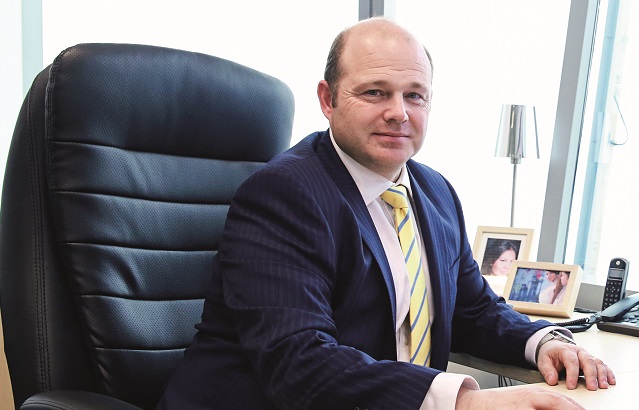Despite some life companies pulling out, Singapore is still a “honeypot”, says Byron Murphy, vice-president, private wealth management at Globaleye, “but only if you are a bee and not a wasp”.
The Bristolian moved to Singapore in 2001, having spent a couple of years in Malaysia, after the Monetary Authority of Singapore (MAS) introduced the Financial Advisers Act.
“Before that, financial advisers could not be in Singapore dealing with expatriates. You had to ‘trip in’ from another jurisdiction and the nearest one was Malaysia,” he says.
He left his previous firm, of which he was managing director, six years ago when it decided to own its own funds.
“I am a great believer in independent financial advice and ‘independent’ means you select whatever investments and solutions you think are right for your clients,” he says.
The move away from independence prompted Murphy to amicably step down from the business and join Globaleye’s new Singapore office.
International exposure
Globaleye’s clients in Singapore are predominately expatriates, “although we tend to call them international investors these days because ‘expatriate’ seems to summon up this imagery of a Caucasian guy from Europe, America or Australia”, says Murphy. The company caters to Singaporeans and other Asian nationals and all “clients usually have an international exposure”.
Changes to how foreign nationals are employed has had a significant impact on the business and types of products Globaleye recommends. Previously, everything from school fees, medical insurance, protection, and housing allowance was built into employment packages.
“Nowadays that is uncommon. Most people just get local contracts and all of that gets wrapped into their salary,” says Murphy. “We do a lot of medical coverage, to top up what clients already have; also protection, as what they have might be inadequate. There is much more need for expatriates now to take care of their medical protection and insurance requirements than in the past.”
Gradual change
Murphy has witnessed at first hand Singapore’s financial advice journey. From its infancy, when few companies were licensed and people were still ‘tripping in’, to the gradual tightening of regulation and the raising of standards.
“I think MAS will have looked at what has gone on around the rest of the world. It is very astute and it sees what is going on. It is measured in what it does and it takes its time doing things,” Murphy says.
That is not to say it lacks commitment, however. “In western markets, they have being quite tough, quickly. In Asian markets, particularly here, they might take a more measured approach over time,” he adds.
Balanced scorecard
One initiative already implemented by MAS is the balanced scorecard, which was launched in April 2015 with a one-year grace period. An individual, other than the wealth manager or financial adviser, must contact clients pre-, during, and post-sale to ensure each and every card is completed. The process involves more than 40 checkpoints for each case.
“There are companies that have the size and scale to be able to deal with it and those that do not. In the past, the latter have been able to muddle through, with various directors wearing multiple hats. That is no longer the case.
“With the balanced scorecard you need a compliance unit, not a compliance officer. Your compliance unit has to be able to manage your balanced scorecard or you have got to outsource it. It is a function of a unit, not an individual.
“It is not just lip service or a random audit. If someone has an infraction it must affect their income. It is not just like telling somebody off – it must really translate into someone’s income or revenue being directly affected,” Murphy says.
“For smaller companies it is very onerous and the impact is specific and defined. You cannot avoid it. It has shaken things up quite a bit, especially for those companies in the domestic market with a larger sales force, some of which have got hundreds, even thousands in their sales force.
“Even if you have got good compliance and very ethical, moral advisers, it still does not change the fact you have to do the monitoring on the balanced scorecard. It is a real cost and a genuine thing.”
Commission cap delay
The country’s measured approach was evident in November 2015, when MAS announced a delay in implementing a 55% cap on the commission financial advisers receive from the sale of life insurance policies. Originally scheduled to come into effect in January 2016, the introduction was delayed by 12 months after the industry argued more time was needed to implement the rules.
An introductory cap of 55% has been imposed on first-year commissions, with the remaining 45% paid out over the following five years or the remaining premium payments years, whichever timespan is shorter.
For Murphy, the delay is more to do with the domestic market and less to do with the expatriate side of the industry.
“The domestic businesses rely so heavily on commission-driven products. The expatriate side of the business here is small in comparison with the domestic side; we are dwarfed by them.”
For Globaleye, however, it is just business as usual, says Murphy.
Hybrid model
Unlike some other jurisdictions, Singapore has not announced any intent to completely ban commissions.
“There has been a bit of an adverse effect in all the jurisdictions where you have barred commission and emphasised costs and fees,” says Murphy.
“The high net-worth and the rich end of the market is still able to pay for the advice, whereas the average or low end of the market is receiving hardly any advice at all.”
For Murphy, the answer might lie in a hybrid model. “Most people do not have a problem paying for something as long as they are receiving good value. It seems to me that no one has quite got it right yet, and there is probably a hybrid model that might work,” he says.
Murphy believes that, given Singapore’s more cautious approach to regulation, “we might actually see that evolve here quicker than in other markets”.
Life companies
Zurich and Standard Life’s decisions to exit Singapore was “annoying”, Murphy says. “When life companies pull out it limits the options available to clients. It does not affect what we can do – we can still do all the things we were doing before – but we have fewer providers.”
However, with the market changing, financial advisers now have alternatives open to them. For Murphy that means looking at platforms. “You just cannot sit back and rely on your future being linked to your current providers,” he says. This is not just because the life companies are pulling out but because they no longer offer products on a regional basis.
“Friends Provident and Old Mutual International are rumoured to be doing it soon, Generali is doing it, Zurich did it before. They will only offer their products to licensed jurisdictions.
“Whereas before we could be based in Singapore and do business with clients in Thailand, in the Philippines, in Malaysia, providers will no longer extend their products to those areas.”
In order to incorporate platforms, businesses in Singapore must apply to modify their MAS licence, something Globaleye is actively pursuing. “The rest of the group uses platforms already because they do not have the regulatory controls we do. In Singapore, you have to get amendments to your licence if you want to start moving in to other areas.
“But we are definitely looking at that right now and we have things in process. We are looking to move away from our reliance on life companies.”
Looking ahead
Even with the additional hoops companies have to jump through in order to operate in Singapore, Murphy believes there are huge opportunities still available.
“You have got to set your business up and run your business here to play within the guidelines. I suppose there is still a fair bit of inconsistency and a bit of the unknown about how it is going to take shape, but the number of players in Singapore is dropping,” says Murphy.
“I know it is a bit cliched but it does seem to be that the quality is surviving and rising to the top. For people that want to do the job right, and do not mind scrutiny and oversight, it is still very much the land of opportunity. There is a huge amount of potential and a huge amount of business to be done here if you do it right.” LW








